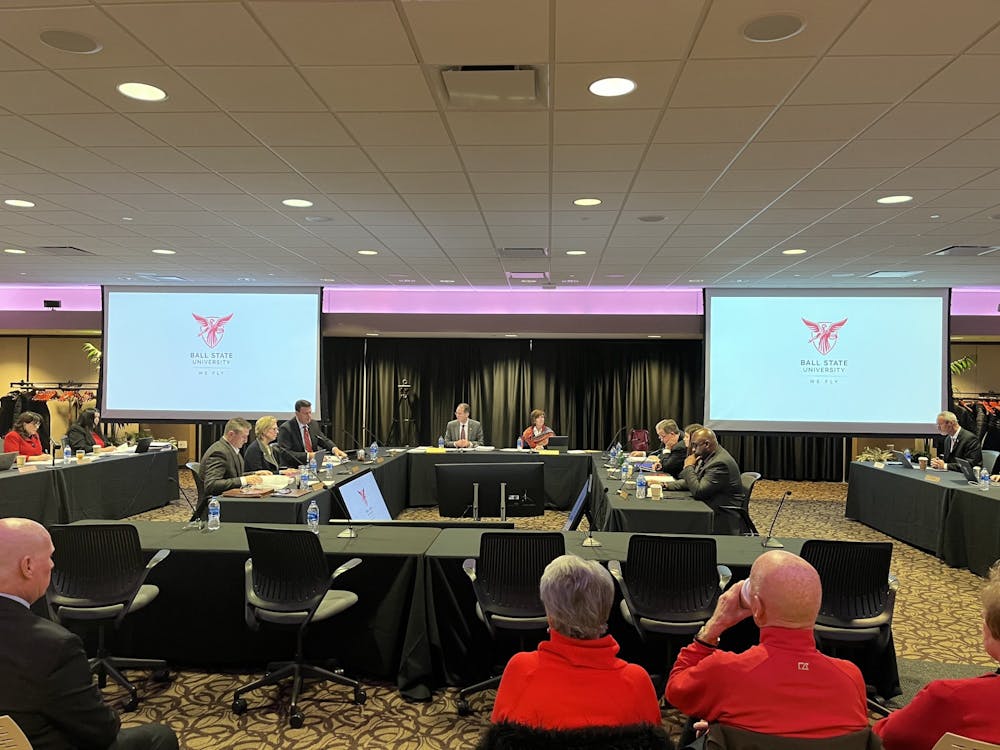Friday, the Ball State University Board of Trustees held their semester-end meeting, addressing business from three different university committees, and holding a general session to close.
The Finance, Facilities and Planning Committee held the floor to start, as Alan Finn, vice president for business affairs and treasurer, spoke at-length over all things monetary for the university. First, he and Amanda Black, chief executive officer and partner with Capital Cities LLC, a consulting firm that assists Ball State with their investments, presented the investment portfolio for the quarter ending Sept. 30, 2022.
While the report showed returns were in the negative for Ball State at -13.70 percent, Black stressed that returns have been low/in the negative nationwide as a result of the challenging economic climate. This report also showed the university’s current operating funds are $81,198,487.
Black said current challenges Ball State faces include volatility in the equity market, rising inflation and rising interest rates. However, despite these challenges, both Finn and Black remained confident in the university’s financial standing.
“Our very strong balance sheet continues, our culture of fiscal responsibility living within our resources continues,” Finn said. “Once the market comes back, which it absolutely will- I can't guarantee it- but the one thing I’ve learned over my career is the market always goes up.”
Finn later presented a financial report for the year ended June 30, 2022 that showed Ball State earned an operating surplus, despite the market challenges. Expenses were reported around $360 million with revenue around $370 million. The university’s outstanding debt was a reported $355,125,000.
To close this committee’s portion of the meeting, Seth Beckman, dean of the College of Fine Arts, sought approval for the naming of two sections at the upcoming Performing Arts Center. The Board of Trustees approved the naming of the Marianne Glick and Mike Woods Lobby of the Performing Arts Center and the Scheumann Studio Theatre of the Performing Arts Center.
Next, the Audit and Compliance Committee went over items that are set to be addressed as part of the 2023 Audit Plan. Finn and Tom Roberts, director of internal audit and advisory services, said this plan should cover areas within the university such as cyber security, concussion protocol in athletics and more.
Then, the Employee Development and Well-Being Committee briefly discussed one position change and six retirements among Ball State faculty.
First, Stephanie Simon-Dack was promoted to become vice provost for research in the Department of Psychological Science. All six retirees will leave with emeritus status, and among them, two were in attendance and honored by Finn.
Karen Ford, associate professor of Curriculum and Instruction in the Department of Educational Studies plans to retire later this month after 30 years, being at Ball State since 1997. Richard Seymour, chair of the department of educational studies and associate professor of educational studies is set to retire in June 2023 after 41 years at the university.
Finn closed the Employee Development and Well-Being Committee section saying those in the human resources department are looking to speed up the interview process for new hires, as the average time to fill a position currently stands at 73 days.
After a brief 10-minute intermission, the Academic and Student Affairs Committee held the floor with Jason Rivera, associate vice provost for student success and dean of university college, and Susana Rivera-Mills, provost and executive vice president for academic affairs, providing updates on student success and retention.
Their report showed 203 unique students attended 376 coaching appointments with the five student success coaches. The report also provided statistics on midterm progress reporting, as 67,944 instructor evaluations were sent, resulting in 53,254 responses from professors (78 percent).
As for academic advising, this report also showed there are four senior advisors, with Rivera saying five more are set to be hired. 31,300 appointments with advisors were held, with 11,347 distinct students creating them and 14,368 of these appointments were scheduled ahead of time via Navigate. Of these, 1,877 resulted in a no-show and 4,648 of them were canceled.
Rivera additionally provided a Navigate report, saying the app recorded 13,075 students logins at Ball State, 34.7 percent of these being new user logins and 65.3 percent of these being returners. Some of the on-campus offices that use Navigate include advising, BSU online, faculty, Honors College and student success coaching.
Ro-Anne Royer Engle, vice president for student affairs, covered some of the ways the university is attempting to provide mental health support for students and staff.
“We’re encouraged that more students are receiving treatment, with the average number of therapy sessions increasing to five from four, which does not seem like a huge change, but this means that typically a student will get an average of 10 weeks of therapy instead of eight weeks,” Royer Engle said. “So, there are some students receiving fewer and there are some students receiving more, but on average, students are getting about 10 weeks of therapy, and for the first time in three years, the majority of our appointments are now in-person.”
Royer Engle said the number of students that are requesting services is down from the highest mark in 2018-19, but is up from last year’s number. However, around nine percent of the student population is receiving services, with 64 percent of that mark being served in-person.
Royer Engle also mentioned 76 students were awarded emergency financial aid this semester, with the university giving out $44,760 total, an average of $589 per student. She said the most prominent reasons for emergency aid cited was assistance with rent, food and books/supplies.
David Ferguson, dean of the CAP, provided an update on the college’s enrollment, citing a 23 percent growth. Additionally, Ferguson said the college is involved in over 500 community projects, over 300 of which are in Muncie.
Pamala Harwood, professor of architecture, introduced three CAP students who gave an update on one of the college’s biggest projects, the construction of The Alley House in Indianapolis (201 N. Temple Ave.).
In Apr. 2023, this project is set to be complete, and it is part of the 2023 Solar Decathlon, a Design & Build competition by the United States Department of Energy. Concrete has already been poured and progress is underway at the build site, as the students provided photos of said progress and blueprints for what the final product should look like.
As part of the Solar Decathlon, the house incorporates solar energy and is carbon-smart too, aiming to be as environmentally safe as possible.
This project is set to be a two-family dwelling with 1300 square feet per unit, three bedrooms and two full bathrooms. The first floor of each section contains a kitchen, a living area, one bedroom and one bathroom, with the second floor holding two bedrooms, one bathroom and one office area. The total cost for this house is $707,000/$287 per square foot.
“I feel like everybody that's been involved in this project has left with significant real world experience,” Harwood said.
After a 40-minute lunch break, the Board of Trustees converged for the final section of their meeting.
The Board approved the renaming of North Residence Hall to Jack Beyerl Residence Hall, due to his standing as the first vice president of student affairs at Ball State and commitment to the involvement of residence halls. Beyerl’s son sat in attendance with tears in his eyes, as university President Geoffrey S. Mearns announced a ceremony to make the renaming official is set for Sept. 2023.
Mearns then sought approval from the Board of Trustees to give Richard Emens, son of John Emens, an Honorary Degree from Ball State at the Fall 2022 Commencement Ceremony, due to the Bracken’s legacy at the university and Richard’s achievements aside from the university. The Board approved.
Finally, Mearns closed the meeting with remarks regarding the aforementioned commencement ceremony, saying more than 1,200 students have completed their requirements for doctoral, master’s or bachelor’s degrees.
“We are proud of their accomplishments, and tomorrow we will extend our best wishes for their future endeavors as alumni,” Mearns said.
The Board of Trustees next meeting is set for March 3, 2023.
Contact Kyle Smedley with comments via email at kyle.smedley@bsu.edu or on Twitter @smedley1932.





